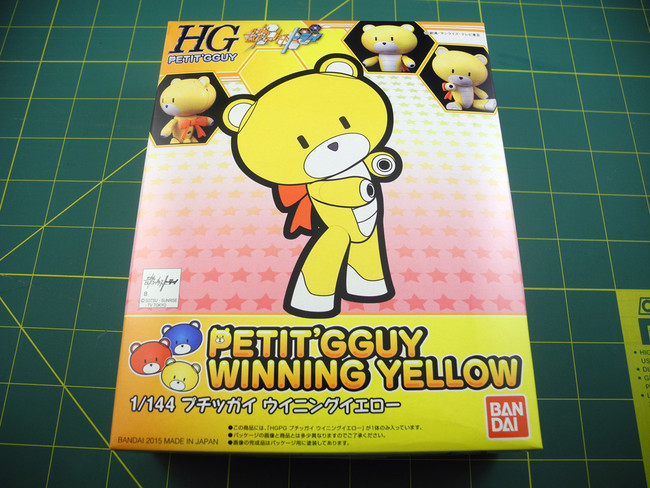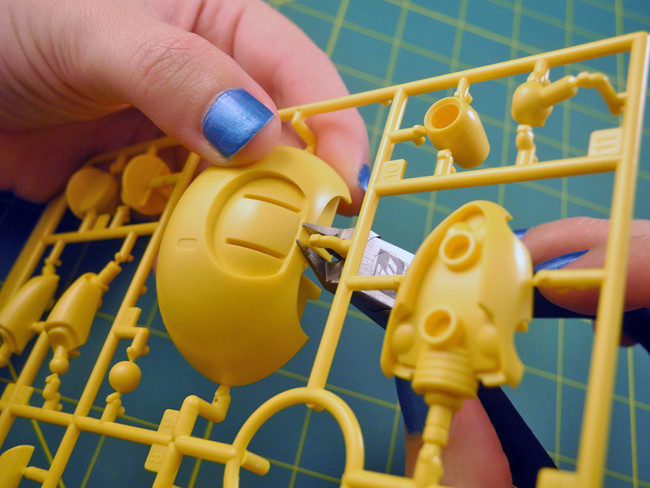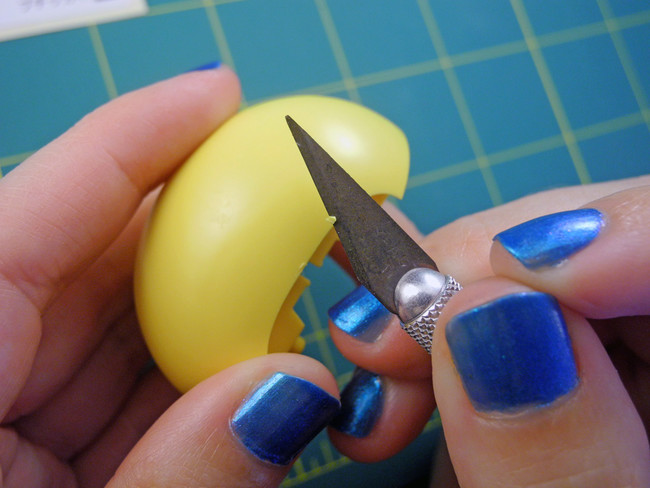So You Want To Build A Gundam Model
by Lauren Orsini,Gundam is one of the most enduring and recognizable franchises in anime. It has been around for more than 25 years of television, producing so-so shows and iconic space operas alike. One thing that has been more consistent than its quality, however, is the fact that each Gundam show comes into being for one ulterior reason—to sell plastic model kits.
Models based off of Gundam mobile suits are called Gunpla, a Japanese word like “cosplay,” which blends two English concepts together. Gunpla takes it a step further by blending the word “Gundam” with the made-up word “plamo,” which itself is a composite of “plastic” and “model.” If you're talking about Gunpla, you're referring to the plastic model kits Bandai produces in massive quantities each year so viewers can bring a piece of Gundam home.
After the recent success of Gundam Build Fighters, a meta show about Gundam fans building Gunpla, the plastic model building hobby is enjoying a renaissance. It's never been easier to get your hands on Gunpla anywhere in the world. What makes Gunpla so appealing is how it scales to a challenge for any experience level. At its most involved, craftspeople apply their own paint and custom touches to enter global tournaments, where the real life Meijin Kawaguchi first made a name for himself. At its most basic, Gunpla is something you can learn to do in an afternoon.
This is a beginner tutorial for anyone who's interested in constructing their first Gunpla. Follow along to learn how easy and accessible this hands-on hobby can be.
Choosing Your First Gunpla
Good news for beginners: Bandai labels Gunpla by how easy they are to build. Gunpla are classified in two ways—by size and by difficulty. In the Gunpla world, you will hear modelers refer to this as “scale” and “grade.”
Scale, or size, indicates how large the model will be once it is built. Take a 1/144 model, which is said to be exactly 144th the size of the “real” mobile suit, if it existed. For example, the “life size” Gundam model in Odaiba, Japan would be said to be 1/1 scale. Scale has been standardized since the ‘90s, and you can typically choose from 1/144, 1/100, and 1/60.

Grade, or difficulty, indicates how complicated the model will be. The higher the grade, the more intricate—and hard, and expensive—the model will be. Grade naming conventions are less intuitive than scales are. High Grade, despite its name, is actually the easiest to build. Next comes Master Grade, and then Perfect Grade. To complicate it further, Bandai is always releasing other grades, like Real Grade and Super Deformed, with varying difficulty. The grade is shortened to two letters in the corner of the Gunpla box—HG, MG, PG, etc.

What does scale have to do with grade? Not much, actually. Take a look at the comparison chart I've made for you. There's two High Grades here that are 1/144 and another that is 1/60. The Super Deformed model doesn't have a scale at all. There's also the fact that Gundam suits as they are depicted on TV have been getting larger over time, so the original Mobile Suit Gundam is a lot smaller than the more recent Gundam Unicorn.
To sum it all up, I suggest selecting a 1/144 High Grade model for your first kit. They are inexpensive (about $20 or less) and Bandai makes more of them than any other size or difficulty, so it'll be easiest to find your favorite Gundam model in that form.
Once you've got the grades and scales down, buying Gunpla is a cinch. The first possibility is buying your Gunpla in person. If you live in the United States, you can pick up kits at your local Barnes & Noble bookstore. Another in-person solution is to visit a hobby shop, the kind that sells model airplanes. I have personally encountered hobby shops that sell Gunpla in Europe, and I've heard you can also find these in Asia and Australia.
If you don't live near a hobby shop, your best bet is the annual anime convention, where vendors will appear in the dealer's room to bring Gunpla to you. Anime convention dealers recognize that you're approaching Gunpla from an anime perspective, and can help you choose the perfect kit for you even if all you know is which suits you like best on the show.
Finally, there are plenty of options for buying Gunpla online. I usually buy my models on Amazon because I can get a lot of them shipped quickly with Amazon Prime. I have also had good luck with Gundam Planet. When I can't find a kit at either place, I'll go to Hobby Link Japan, which ships from Japan and takes a lot longer to get to me.
Building Your First Gunpla
When your Gunpla arrives, you'll notice that the instructions are entirely in Japanese. If you don't read Japanese, fear not! You do not need to know Japanese to build Gunpla. Let's take a look at the instructions of my latest kit, an HG Petit Beargguy from Gundam Build Fighters Try:

Notice that the instructions consist of images, with hardly any text at all. To build a Gunpla, all you need to be able to do is duplicate the image in front of you with the parts you have.
Let's start with step one, which tells us to take out piece I9. The letter refers to the sprue, or plastic runner into which the piece is embedded, while the number refers to the part itself. On the sprue, you will easily find the number next to the piece it identifies. Using this convention, you can quickly find any piece you need.

Notice also that this sprue is bright yellow, the same as the picture on the front of the kit. Since Gunpla come pre-colored, you do not need to paint anything.

Let's take out piece I9. Gunpla kits are designed so you could do this with your fingers if you want. It really is that easy! However, as you get deeper into the hobby, you'll notice that most people use side-cutters, which look like extremely small gardening shears. You can buy wire side-cutters in the jewelry aisle at the craft store. If you have the opportunity, you can also buy side-cutters designed for hobbyists. I have been using Tamiya hobby side-cutters that I bought on Amazon for years, but recently switched to Gundam Planet side-cutters designed specifically for Gunpla. Your side-cutter choice—or using side-cutters at all—is entirely up to you.
Looks like we need to connect I9 with I8, which is the back of the head. Believe it or not, you won't need any glue to do this. Gunpla are snap-together kits, with little pegs and notches through which the pieces will connect to one another and stay connected forever. Even more advanced modelers do not use glue on their Gunpla, because it makes them less poseable.
Next I take out more pieces for assembly, I do not recommend taking out more than the amount you need for one step, or you might get confused or lose pieces. The extra pieces I'm adding to I9 and I8 make up Beargguy's ears and muzzle.

I took out I8, but it has a little nub sticking out that I don't like. So I'm going to remove this imperfection with my X-Acto knife. All I'm doing here is slicing off the nub that sticks out so my finished Gunpla is smoother. You can get an X-Acto knife at the craft store.

Having cleaned the pieces up with my knife, I will assemble them by snapping them together.

Almost there! Petit Beargguy has no features. So I'm going to use the stickers that came with the kit to fill in the eyes and nose. I could use my fingers, but I'm using tweezers here for increased precision and to avoid getting my fingers’ oil on the sticker and making it lose its stickiness.

All right! That's the completed Beargguy head. We put this together without paint, glue, or reading any Japanese. We used some tools for sure, but that was my decision, not a necessity. By following the instructions, anyone can build Gunpla.
Frequently Asked Questions
I love building Gunpla so much, I started a site called Gunpla 101 where I share tutorials and encourage other Gundam fans to get involved in the hobby. I encourage readers to contact me, and I get a lot of questions. Here are the questions I get most often, that you might have, too.
What's the best Gunpla kit for beginners?
I recommend any 1/144 High Grade kit that matches your favorite mobile suit, but it's true some are much more difficult than others. If you're looking for a bare basics kit, you can't get much simpler than the RX-78-2 Gundam AKA the main mobile suit in Mobile Suit Gundam. It's extremely inexpensive and small and low complexity.
For something cuter but equally simple, you could try one of the Petit Beargguys like the yellow one I assembled in this tutorial. I recently bought one for a friend to put together as his first ever Gunpla, and it took him about 30 minutes to assemble, having never built one before.
When am I ready for a higher difficulty?
Only you know when you're ready to move from building High Grade models to Master Grade models. When you find yourself putting High Grades together more quickly than you used to and are ready for a new challenge, consider getting your first Master Grade, but don't expect it to be easy! I built about 20 different High Grade and Super Deformed kits before I felt comfortable building a Master Grade, and even then it took me several days to complete.
Overall, I think it's more important to choose a model you actually like than one that fits your exact skill level. If you really love the suit it's based on, you'll be motivated to build the Gunpla.
Do I need to have watched to show to build the model?
Definitely not. Nobody worth being friends with is going to quiz you on the kit you've built. I find that building Gunpla is a fun way to get motivated about watching a show. For example, I built Strike Rouge while I was watching the show it is from—Gundam Seed Destiny (but unfortunately, it didn't make the show any less terrible).
Do Gunpla need to be cleaned or maintained?
Think of Gunpla as more delicate versions of anime figures. Since you built them yourself out of dozens of tiny parts, you're going to want to treat them more gently.
When my Gunpla look dusty, I brush them down with old (clean) makeup brushes, which are delicate enough to remove dust without adding scratches. I don't do this as much anymore because I bought a glass display case for Gunpla that keeps the dust out.
I broke it! What do I do?
Use regular superglue to attach the part back together. If it's a joint that broke, make sure you like the pose you put it back in, because it may lose some mobility. Probably half of my Gunpla have a piece that has been superglued back on, and nobody who looks at them is the wiser.
Interested in learning more about Gunpla? I've written extensively on the topic! Read about my recommended tools, instruction symbols and their meanings, applying topcoat, applying decals, working with vintage kits, the history of Gundam, and more.
discuss this in the forum (28 posts) |